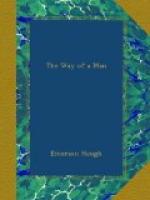I was glad, therefore, when we saw the first timber of the foothills; still gladder, for many reasons, when I found that we were entering the winding course of a flattened, broken stream, which presently ran back into a shingly valley, hedged in by ranks of noble mountains, snow white on their peaks. Here life should prove easier to us for the time, the country offering abundant shelter and fuel, perhaps game, and certainly change from the monotony of the Plains.
Here, I said to myself, our westward journey must end. It would be bootless to pass beyond Laramie into the mountains, and our next course, I thought, must be toward the south. I did not know that we were then perhaps a hundred miles or more northwest of Laramie, deep in a mountain range far north of the transcontinental trail. For the time, however, it seemed wise to tarry here for rest and recruiting. I threw down the pack. “Now,” said I to her, “we rest.”
“Yes,” she replied, turning her face to the south, “Laramie is that way now. If we stop here my father will come and find us. But then, how could he find us, little as we are, in this big country? Our trail would not be different from that of Indians, even if they found it fresh enough to read. Suppose they never found us!”
“Then,” said I, “we should have to live here, forever and ever.”
She looked at me curiously. “Could we?” she asked.
“Until I was too old to hunt, you too weak to sew the robes or cook the food.”
“What would happen then?”
“We would die,” said I. “The world would end, would have to begin all over again and wait twice ten million years until man again was evolved from the amoeba, the reptile, the ape. When we died, this dog here would be the only hope of the world.”
She looked at the eternal hills in their snow, and made no answer. Presently we turned to our duties about the camp.
It was understood that we should stay here for at least two days, to mend our clothing and prepare food for the southern journey. I have said I was not happy at the thought of turning toward that world which I had missed so little. Could the wild freedom of this life have worked a similar spell on her? The next day she came to me as I sat by our meager fireside. Without leading of mine she began a manner of speech until now foreign to her.
“What is marriage, John Cowles?” she asked of me, abruptly, with no preface.
“It is the Plan,” I answered, apathetically. She pondered for a time.
“Are we, then, only creatures, puppets, toys?”
“Yes,” I said to her. “A man is a toy. Love was born before man was created, before animals or plants. Atom, ran to atom, seeking. It was love.” She pondered yet a while.
“And what is it, then, John Cowles, that women call ’wrong’?”
“Very often what is right,” I said to her, apathetically. “When two love the crime is that they shall not wed. When they do not love, the crime is when they do wed.”




